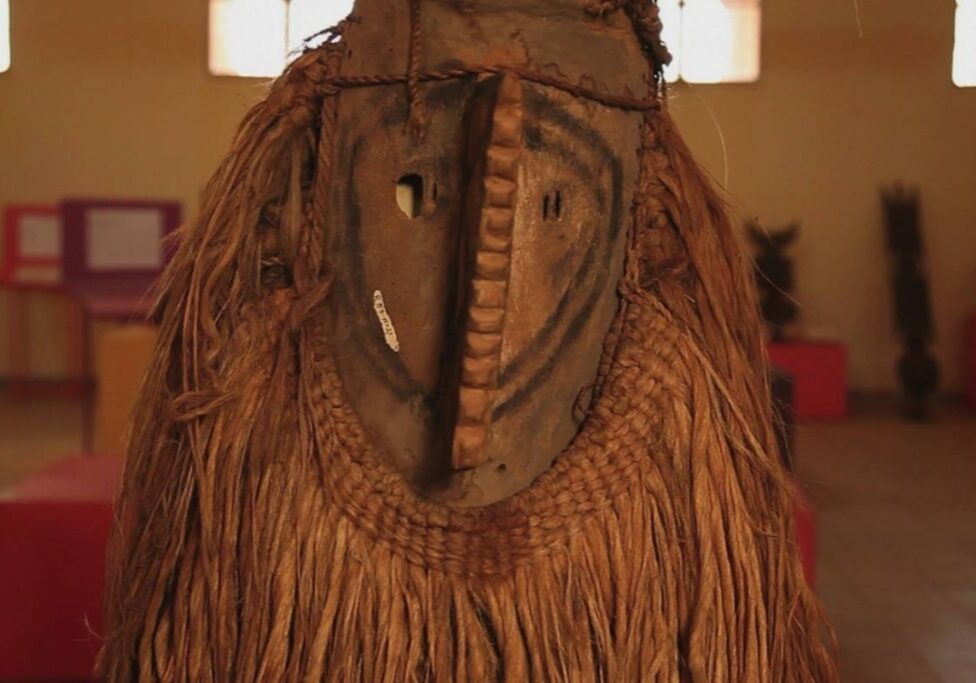
MAI - the programme goes online
The series of documentaries that we offer on Più Compagnia from December 14th (free access) is an integral part of the MAI – Museo Antropologico Immaginario multidisciplinary project curated by Valeria D’Ambrosio for Villa Romana in Florence and realized thanks to the contribution of the Fondazione CR Firenze. Being a partner of the project, Festival dei Popoli, proposes a selection of documentaries from its Archives related to the themes of the MAI in order to develop the food for thought triggered by the exhibition.
Within the MAI, various practices are confronted with the aim of decolonising thought and vision through creative languages unhinged by the objectivising distance of the scientific discipline. Contemporary art, Radical Architecture, Live Performance and Documentary Cinema are in fact called upon to reason about the role of Ethnographics & Anthropological Museums in contemporary Society. This can be made focusing on the dynamics of representation of human cultures no longer seen through an essentially Eurocentric and static filter, but trying to create real participatory models and a wide network of collaborations to tell stories of the Past, narratives of the Present and possible visions of the Future.
In response to this call, the Festival dei Popoli Archives propose a programme of international films questioning and rethinking the concept of an Anthropological Museum, and which aim to bring together cultures and populations that every day seek to bring ancient traditions into dialogue with the demands of the contemporary world.
Monday 14 December 2020 – Più Compagnia (Click to enter)
(the event will be available for 72 hours – reserved to the Italian territory only)
The films will be accompanied by a presentation by the Festival dei Popoli Archives
Le terrain du peuple, by Anja Göbel
(Germany, 2015, 34’ – o.v. in French and local languages, English Subtitles)
The National Museum of Ouagadougou, in Burkina Faso, commissioned by Thomas Sankara to promote the indigenous cultures of his country, which has become independent, has become a point of convergence (and friction) of problems caused by an overly authoritarian museum concept. To build the museum, the local king was deprived of his Throne Room – a “public” place, where the sovereign meets his people – and the royal space was incorporated from the courtyard surrounding the museum. In addition, some of the most prominent members of the community are opposed to an object of ritual use, considered sacred and “living”, ending up under a glass case, where It is destined to “die”. Gently approaching the heart of the problem and without attempting to resolve the complex tangle of contradictions, the film proposes the example of a National Anthropological Museum that causes sorrow and arouses opposition from local cultures, which the museum itself intended to celebrate. (A. Lastrucci)
Abigail, by Valentina Homen and Isabel Penoni
(Brasil, 2016, 17’ – v.o. portuguese – English subtitles)
From 1940 through 1950 Abigail Lopes took part in the expeditions of Francisco Meireles, known in Brazil for trying to establish peaceful relationships with the native populations living in isolated areas. Abigail came in contact with the Xavantes in the Serra do Roncador, state of Mato Grosso, and spent there eight years of her life. The film portrays the encounter between the two young film-makers and the aged researcher before her death in 2011. Her house was full of memories and mementos from a past marked by a wealth of encounters and contaminations. Abigail lived there, animating decades of discussions about the connection between ethnic culture and ancestral African-Brazilian religions, which she joined.
“Abigail is a film on our memories of this extraordinary figure, on our encounter with her, and our experience in her home.” Isabel Penoni (also the film narrator) and Valentina Homem make a film about the spiritualist power of memory rather than on a memory. This power can break places and things as well as find the flow of an impersonal soul across time, in nature, and in objects. (A. Lastrucci)
Extremos – Viaje a Karukinka (Extremes – Expedition to Karukinka)
by Federico Molentino and Juan Manuel Ferraro
(Argentina, 2015, 26’ – not spoken)
We are in Tierra del Fuego, an archipelago at the southern end of the South American continent, destination of many tourist cruises every year. Images of a remote past, showing representatives of the original populations dressed and hairstyled according to tradition, are superimposed on the present views. The evocative juxtaposition illustrates a landscape violently disfigured by industrial exploitation, now populated, for a few moments, with ghostly presences. This ‘Journey to the Extremes’ finally arrives in the places where the descendants of those proud ancestors were destined: depersonalising factories which, this is the silent warning proposed by the film, constitute the final step of a process of colonisation that has never been interrupted. (A. Lastrucci)
How to access
All screenings are free on the Più Compagnia platform.
The films are in original language, with English subtitles.
***
MAI is a project of Villa Romana, curated by Valeria D’Ambrosio, realized with the contribution of Fondazione Cassa di Risparmio di Firenze with the Patronage of the Municipality of Florence and the Tuscan Region. The SAGAS UniFi Department is the scientific partner of the project.
The film review, curated by Alberto Lastrucci and Daniela Colamartini of the Festival dei Popoli Archives, is part of the project for Cataloguing, Digitisation and Valorisation of the Festival dei Popoli and Mediateca Toscana Archives, which involves the Tuscan Region nd the Tuscan Archival and Bibliographic Superintendence.

